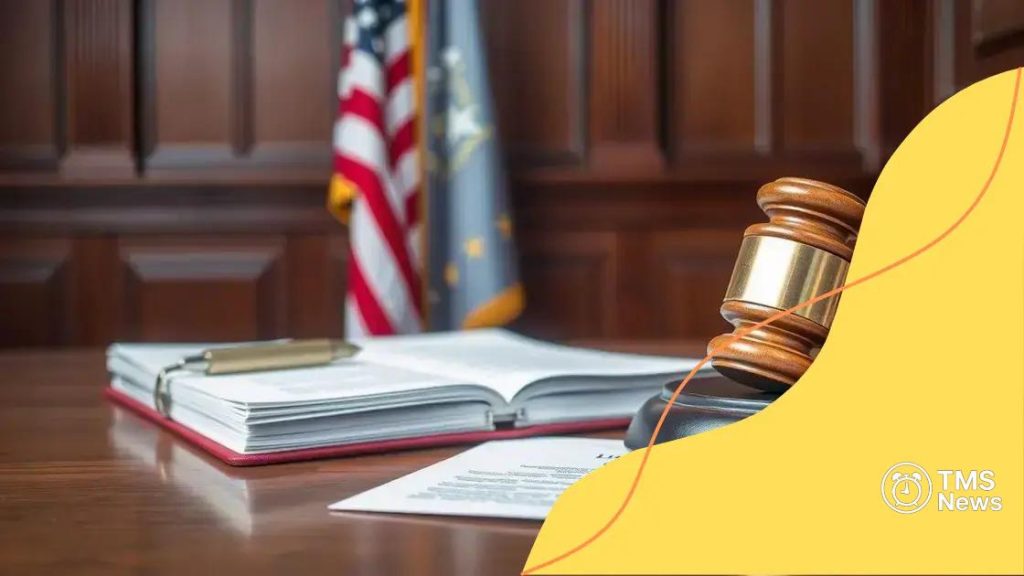Trump administration legal challenges: what you need to know

Anúncios
The Trump administration faced significant legal challenges that altered public trust, heightened political polarization, and set precedents influencing future governance and accountability in the U.S.
Trump administration legal challenges have become a pivotal aspect of recent American politics. As inquiries and lawsuits unfold, many are left wondering: how will this affect the broader political landscape? Let’s dive into the key issues and implications.
Anúncios
Overview of the Trump administration’s legal challenges
The Trump administration’s legal challenges have drawn significant attention, impacting many areas of governance and public opinion. Various cases have surfaced, reflecting the complexities of political and legal interactions.
Key Legal Cases
Throughout President Trump’s term, numerous legal battles emerged. These cases often revolved around significant issues such as immigration policies, financial dealings, and accusations of misconduct. Each case not only influenced the administration but also shaped public perception.
- Immigration bans and legal disputes
- Investigations into business practices
- Accusations of obstruction of justice
- Electoral issues during and after the 2020 election
Moreover, the legal hurdles faced by the administration are not isolated incidents but part of a larger narrative about power and accountability in politics. As these cases unfolded, they revealed the intersections between law and the presidency.
Anúncios
Much of the legal landscape during Trump’s presidency involved high-stakes battles. These challenges not only tested the limits of presidential power but also set precedents that may influence future administrations. Observers noted that courts were increasingly seen as a battleground for political conflicts.
Impact on Public Opinion
The legal challenges faced by the Trump administration have significantly affected public opinion. Many people became more aware of their political and legal systems, leading to increased engagement and activism. This rise in political awareness is crucial as it shapes the future landscape of American democracy.
As investigations continued, various factions formed, with supporters rallying around their beliefs while detractors amplified calls for accountability. These divisions highlight the polarized environment that existed during Trump’s presidency, drawing a clear line between supporters and opponents.
Ultimately, the ramifications of the Trump administration’s legal battles extend beyond politics; they affect the very fabric of society. The outcomes of these challenges could redefine how future administrations navigate legal scrutiny and public expectations.
Key cases that defined the administration’s term
During the Trump administration, several key cases emerged that had a profound impact on its legacy. These legal battles not only shaped policy but also illustrated the intricate relationship between law and politics.
Immigration Policies
One of the most controversial cases involved immigration. The administration’s attempt to implement a travel ban on several predominantly Muslim countries faced immediate legal challenges. Courts questioned the constitutionality of this ban, spotlighting the ongoing debate about national security and religious freedom.
- Travel bans and their legal hurdles
- Policies on family separations at the border
- Challenges to DACA (Deferred Action for Childhood Arrivals)
- Nationwide injunctions against state laws
Another critical case was related to the administration’s approach to environmental regulations. Lawsuits by several states against federal rollbacks of environmental protections highlighted the tug-of-war between state and federal powers. These cases revealed deep divisions regarding climate policies and the extent of federal authority.
Business Practices
Legal scrutiny also fell upon the Trump Organization, particularly regarding its financial dealings. Investigations looked into allegations of fraud, which raised questions about transparency and ethics in business operations. The outcomes of these cases had the potential to reshape how future administrations handle financial disclosures and accountability.
Additionally, the impeachment proceedings based on accusations of abuse of power illustrated the intense scrutiny faced by the administration. This marked a significant moment where political and legal issues intertwined, raising questions about the limits of presidential power.
Through all these key cases, the legal challenges presented opportunities for judicial reassessment of executive authority. The outcomes influenced not only the Trump presidency but also set precedents for how future leaders may navigate legal landscapes.
Implications for future political landscapes

The implications for future political landscapes following the Trump administration’s legal challenges are profound. As these cases play out, they set important precedents that could shape the interaction between the executive branch and the judiciary.
Shifts in Executive Power
One significant implication is the potential shift in how future presidents may wield power. Legal challenges during Trump’s term exposed the limits of executive authority and emphasized the role of the judiciary in checking that power. This dynamic may lead new administrations to approach their policies with a greater awareness of legal scrutiny.
- Increased accountability for presidential actions
- Greater reliance on judicial interpretations of executive power
- Potential for more lively political discourse
- Heightened awareness of constitutional rights
Additionally, the political divisions highlighted by these challenges may alter how parties engage with each other. As legal battles became a central part of the political narrative, we can expect future administrations to be more cautious in their strategies, knowing that actions may have immediate legal repercussions.
Impact on Voter Engagement
The ongoing legal issues also contribute to a changing landscape of voter engagement. Increased visibility of legal processes has led to heightened public awareness about political accountability. This could energize voters who may feel compelled to participate actively in the political process.
Furthermore, as the legal challenges continue to unfold, citizens may feel that their voices matter more than ever. Political activism has surged in response to various court cases, influencing how parties approach campaigns and policy messaging.
In summary, the legal challenges faced by the Trump administration will likely have lasting effects on future administrations and the overall political climate. Understanding these implications is vital for citizens, politicians, and analysts alike.
Responses from key political figures and organizations
The responses from key political figures and organizations during the Trump administration’s legal challenges were varied and often intense. Many leaders used these moments to either defend or criticize the administration’s actions.
Political Figures’ Reactions
Democratic leaders frequently spoke out against the administration’s legal strategies, arguing that they undermined the rule of law. Figures like House Speaker Nancy Pelosi and Senate Minority Leader Chuck Schumer criticized Trump’s decisions, claiming they jeopardized democratic institutions. Their statements often called for accountability and emphasized the importance of adhering to legal standards.
- Calls for independent investigations
- Support for legal challenges against administration policies
- Resolutions aimed at safeguarding democratic norms
- Public statements framing the legal battles in moral terms
Conversely, Republican figures often rallied to support Trump, framing the legal challenges as politically motivated attacks. They argued that these efforts were attempts to undermine his presidency and divert attention from his policy achievements. Prominent supporters, such as Senate Majority Leader Mitch McConnell, frequently defended Trump’s actions while criticizing the motivations behind the legal pursuits.
Organizational Responses
Various organizations also played significant roles in responding to the legal controversies. Advocacy groups like the American Civil Liberties Union (ACLU) took legal action to challenge the administration’s policies, particularly on immigration and civil rights. These organizations highlighted the implications of Trump’s actions for constitutional rights.
On the other hand, conservative organizations consistently backed Trump, framing their support in the context of a broader ideological battle. Groups like the Heritage Foundation emphasized the importance of the administration’s judicial appointments and legislative goals, arguing that the legal challenges represented an assault on those initiatives.
Overall, the reactions from key political figures and organizations reflected the polarized nature of American politics during this time. The legal challenges did not only serve as significant events in the courts but also as flashpoints in the ongoing political discourse.
The ongoing impact on public opinion and trust
The ongoing impact on public opinion and trust resulting from the Trump administration’s legal challenges has been significant. As various cases unfolded, many Americans began to reevaluate their views on both the government and its leaders.
Shifting Perceptions of Leadership
One major outcome has been a decline in trust in governmental institutions. The constant legal battles created a sense of chaos, leading many citizens to question the integrity of political leaders. This skepticism extended beyond the Trump presidency, affecting how people view all elected officials.
- Increased distrust in the executive branch
- Heightened scrutiny of government actions
- Calls for transparency and accountability
- Polarization of public opinion
Moreover, the divisive nature of the legal challenges amplified existing political divides. Many supporters viewed the challenges as baseless attacks, while opponents saw them as necessary for upholding the law. This polarization has made it difficult for citizens to find common ground in political discussions.
Public Engagement and Activism
Another important impact has been greater public engagement. The visibility of the legal issues prompted increased participation in political activities, such as protests and advocacy campaigns. Citizens are more motivated to voice their opinions and concerns, driven by a desire for accountability.
This shift in public sentiment is crucial. As Americans become more engaged, they are more likely to advocate for changes in policy and leadership. The challenges faced by the Trump administration may have sparked a more active political landscape, where people feel empowered to demand their rights.
As trust in traditional institutions declines, alternative platforms for discourse have emerged. Social media has played a pivotal role in shaping opinions and mobilizing citizens around legal and political issues. This trend reflects a broader transformation in how Americans communicate about governance and democracy.
FAQ – Frequently Asked Questions about the Trump Administration’s Legal Challenges
What were the main legal challenges faced by the Trump administration?
The main legal challenges included immigration policies, business practices, and accusations of abuse of power, which led to numerous court cases.
How did these legal challenges affect public opinion?
Public opinion shifted, leading to increased distrust in government institutions and a more engaged citizenry advocating for accountability.
What role did political figures play during these legal challenges?
Political figures were divided, with Democrats calling for accountability and Republicans often defending the administration against what they labeled as political attacks.
How have these challenges influenced future political landscapes?
The challenges have set important precedents, prompting future leaders to navigate governance with greater awareness of legal scrutiny and public trust.





